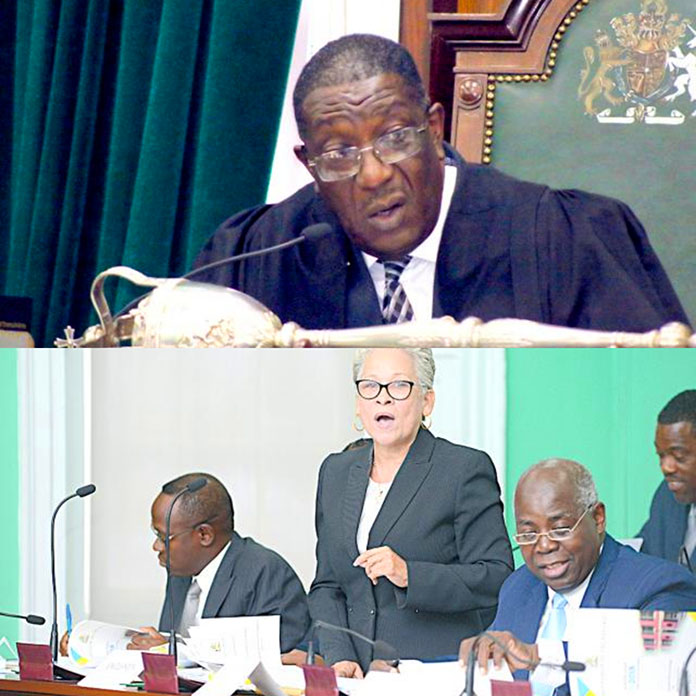SPEAKER SHOULD NOT BE ATTACKING HIS PARLIAMENTARY STAFF!

Dear Editor,
I watched the rebroadcast of the House sitting of January 31, 2018, and I was genuinely alarmed and disturbed at what I saw and heard. I was alarmed because of the extraordinary length the speaker seemed prepared to go to chasten and discredit an elected member of Parliament. The speaker should never put the chair in a position where it is in open and obvious controversy with a member. The last time I can recall this happening was some 10 to 15 years ago, when a speaker withdrew from the chair whenever a certain member rose to speak. This ought never to occur.
From what I gleaned from the rebroadcast, at the previous meeting of the House, the speaker ordered certain alleged remarks by Englerston MP Glenys Hanna-Martin expunged from the records of the House. Hanna-Martin requested a report from the Hansard of those remarks. Reading from the Hansard report at the next meeting, Hanna-Martin claimed that the report confirmed that she never made the remarks the speaker purported she made.
Instead of dealing with this specific matter, the speaker, obviously coached and rehearsed for the situation, introduced a number of extraneous issues. He went as far as taking the unusual step of requesting and reviewing previous requests for Hansard reports by Hanna-Martin. He came to the conclusion from the records of the Hansard, that, in each and every previous case whenever the member claimed that another member said something, she was proven wrong. This “pattern” of behavior that the speaker “discovered” regarding the member of Parliament, has no place in the speaker’s ruling, as it suggests the intent to discriminate and victimize the member of Parliament for Englerston, something that the speaker should never be accused of doing. The speaker, in Trump-like style, attributed his conclusions to his “scientific training” and as an “observational analyst”.
I was also alarmed by another ruling by the speaker. The speaker noted correctly that any member had the right to bring a perceived breach of the rules of the House to the speaker’s attention. Hanna-Martin made the assertion earlier that the firings of two women at airports on Eleuthera were politically motivated. In my view the assertion was not a breach of the House rules, but the opinion of a member. The speaker and all members should familiarize themselves with the principle of parliamentary free speech. It is not necessary for a member, each time they make a political statement, to preface that statement with “in my opinion” or “in my view”. This principle is the very foundation of parliamentary debate and discourse. Without a clear and unfiltered understanding and application of the principle there can be no genuine democracy.
However, I am most disturbed by the speaker’s intended or maybe unintended undermining of the parliamentary staff. I am not sure if the comments were in his prepared remarks, but he uttered the following troubling words: “I am new here. I don’t know who is who, and I don’t trust people until they earn my trust.” The speaker went on to admit that what he just said might be controversial but it was the position of the chair; a most disturbing and alarming position for the chair to take. These words were an obvious reference to the House of Assembly’s staff generally and the staff in the Hansard in particular. Politicians have the opportunity and the forum to self-defend when attacked by others, however, public officers are not afforded these same privileges. The speaker’s words about not knowing “who is who”, at best, were a snide reference to the staff members’ perceived political leanings; at worst, he was questioning their fidelity to the institution and their personal integrity. Either way, it was most ungracious of the speaker. He claimed that he was more comfortable viewing the DVDs, which he requested from ZNS rather than relying solely on the reports from Hansard, which are the official records of the House.
The House of Assembly’s staff members are hardworking, honest and loyal to the government of the day. This intervention by the speaker was gratuitous, disloyal and most unfortunate. For the most part, the current staff worked with me during my tenure as clerk, and I can attest to their competence, diligence and dedication, despite the substandard working conditions and absence of resources required in a 21st century Parliament. They ought to be commended for their loyalty and not demoralized publicly by their political boss. I do not know if this was an attempt to intimidate or threaten them, but I do know that it was neither helpful nor smart from a scientific or analytical perspective.
The speaker is authorized by the rules to order any member to withdraw immediately from the House for disorderly conduct for a maximum of two days. This order can be made by the chair without a motion. The speaker can also name a member for a variety of breaches other than disorderly conduct, which are set out in the rules. However, the naming of a member by the speaker requires a motion to be put. I did not hear a motion moved. I do not know why the speaker seemed surprised and offended by the opposition members’ withdrawal from the House, as he had invited them to do so if they could not abide by the rules. It is evident they could not abide by his interpretation and application of the rules, and they took him up on his invitation.
The House of Assembly, in its Westminster model, is an adversarial debating chamber. One side proposes while the other side opposes. It can only function efficiently, effectively and in the interest of the Bahamian electorate if it is presided over by an independent, fair and knowledgeable speaker. The speaker, by his temperament and fairness, should be able to reduce the acrimony and vitriol so common in the House of Assembly. I have always disagreed with first time parliamentarians being “selected” as speakers. It is an office that traditionally was attained through parliamentary experience and a familiarity with Westminster practices. Members who demonstrated a proficiency in procedure and the rules would normally graduate to the office of speaker. I must commend the most recent speaker, Dr. Kendal Major, who got it, and tried as best he could to be fair especially to the minority in the House. This stand, unfortunately, often got him in trouble with his political colleagues. But that is exactly the risk you have to take in accepting the role as speaker. You must be courageous and fair, even if it requires you to rule against a member of your own political party. Sound difficult? Democracy is hardly ever easy.
There ought to be a level of congeniality between the speaker and members of Parliament. The chair ought to be heard in silence and his orders respected. The chair has a duty to ensure that the business of the House is conducted fairly and judiciously and each member’s rights are protected. He has a special duty to safeguard the rights of the minority in the House, especially so, as the numbers in this House are so skewed. He should, at all times, guarantee that the minority in the House have their say, even though the majority will have their way. The speaker should, at all times, receive the best professional and apolitical advice as possible. It seems that the speaker is not always receiving sound advice. While the chair does not always have to heed sound advice, he should not be led into temptation.
– Maurice Tynes







